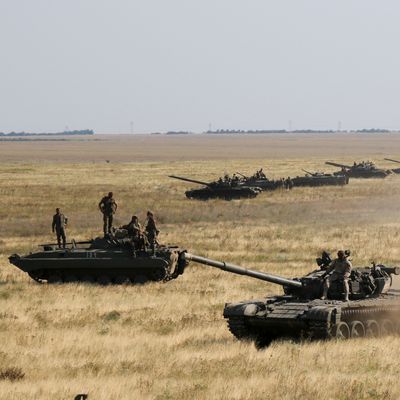
Russia appears to be preparing for a new military offensive in Ukraine, according to the Institute for the Study of War, which notes that since August 5 there has been an ongoing Russian military buildup on the northern, eastern, and southern Ukrainian borders, allowing it “to threaten or conduct military operations into Ukraine from multiple directions, increasing Ukraine’s vulnerability to Russian or Russia-backed separatist forces.”
The looming possible escalation follows claims by Russia’s FSB state-security service earlier this week that it had prevented two attempts by Ukrainian special forces to launch attacks in Russian-held Crimea. Foreign Policy reports that Ukrainian officials denied Russia’s claims, with Ukrainian president Petro Poroshenko declaring that Russia’s accusations were “insane.” For his part, Russian president Vladimir Putin has responded to the alleged threats by vowing to take “further security measures” in Crimea, though a spokesman for Ukraine’s foreign ministry suggested that Putin really just “wants more war.” On Friday, Vice-President Joe Biden urged Poroshenko to avoid escalating the conflict as much as possible.
That might prove impossible, however. As CNN pointed out on Thursday, Ukraine’s military forces are now on high alert as they scramble in anticipation of a Russian attack, and overall tensions are the highest they have been since Russia’s 2014 annexation of Crimea, which led to the now two-year-old war in eastern Ukraine. The ISW adds that Ukraine’s military mobilization on its borders with Russia and Crimea “will tax [the country’s] finances and military capabilities and may also further weaken Ukraine’s fragile political situation.”
Foreign Policy’s Reid Standish adds some more context regarding what has become an increasingly bloody summer because of the conflict:
The renewed hostilities in Crimea come as violence has surged during the summer months in eastern Ukraine despite a nominal ceasefire. More than 9,000 have died since the war began in April 2014, with more than 600 Ukrainian soldiers killed in fighting so far this year. According to recently released figures by the Office of the U.N. High Commissioner for Human Rights, civilian casualties have spiked to a level not seen since August 2015, prior to the implementation of the most recent ceasefire.
In addition to Russia’s military buildup, it has been conducting provocative military exercises in the region, with more planned near the Ukrainian border and inside Crimea next week. The BBC reports that it has now delivered advanced air-defense missile systems to Crimea as well. Those missiles are designed to hit airborne targets from as far away as 249 miles, which means they could reach deep into Ukrainian territory. For an idea of the scale, timing, and range of Russia’s renewed offensive capabilities in the region, see below:
So assuming that Ukraine is right, and Russia is fabricating reasons to pursue a premeditated escalation of hostilities — why would they do that? According to Reuters, Russia’s claims of Ukrainian incursions into Crimea could just be a way for it to back out of peace talks that had been planned for next month’s G20 summit in China, or as a way to gain more leverage over Ukraine and the West whenever those talks do occur. Volodymyr Fesenko, a political analyst in Ukraine, told Reuters that he didn’t think Putin would “go all out for a big war,” but Russia’s plan could focus on smaller military operations in order to “scare the West with the prospect of full-scale conflict with Ukraine” — thus pressuring Kiev to accept Russia’s preferred plans to resolve the war.
The Economist has a few theories as well:
The timing of the spat is notable in light of upcoming elections in both America and Russia. American officials say that Barack Obama, America’s outgoing president, has made it clear that he wants progress on Ukraine before the end of his term. Victoria Nuland, the American State Department official responsible for Ukraine, has been in talks with Vladislav Surkov, a close confidant of Mr. Putin. By rejecting the Normandy Four format, Mr. Putin may be hoping to pressure Mr. Obama into making the grand Yalta-style bargain he has long desired.
A re-run of the Ukrainian drama may also play well domestically ahead of Russia’s parliamentary elections on September 18th. As the country’s economic crisis grinds on, the looming vote has the Kremlin anxious. Dmitry Medvedev, Russia’s prime minister, drew widespread criticism in May when he told a griping Crimean pensioner that “There’s no money, but hang in there — all the best to you!” While the war in Ukraine has largely disappeared from state media in recent months, its return to the headlines could provide a welcome distraction.
Speaking of influence on an election: Any renewed or expanded conflict in Ukraine could also have implications for the U.S. presidential race, since Republican nominee Donald Trump is largely seen as sympathetic to — and sometimes even admiring of — President Putin, and because members of his campaign are directly entangled with elements of the Russian regime. Trump and his campaign have also sought to downplay the threat that Russia poses to Ukraine. They softened the language in the official GOP platform regarding the conflict, and Trump insisted in a recent interview that President Putin “is not going into Ukraine.” He said recently that he would not defend America’s Baltic NATO allies against Russian invasion. There is also the added intrigue of the extensive cyberattack on U.S. Democratic Party groups, which is believed to have been perpetrated by hackers working for Russia, and the possibility that the U.S. will issue new sanctions on that country as a result.






























